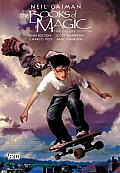Becoming an Author in the Worst Way
 On Monday I attended an event at the Cambridge Public Library kicking off World Book Night, a European tradition that’s being promoted here. It involves applying for the privilege of giving away forty copies of a book to people who don’t read much. And somehow it’s connected to the date when Miguel de Cervantes and William Shakespeare died, except not really.
On Monday I attended an event at the Cambridge Public Library kicking off World Book Night, a European tradition that’s being promoted here. It involves applying for the privilege of giving away forty copies of a book to people who don’t read much. And somehow it’s connected to the date when Miguel de Cervantes and William Shakespeare died, except not really.
The event featured a panel of three local authors whose novels had been selected for this year’s World Book Night program:
- Lisa Genova, author of Still Alice.
- Vanessa Diffenbaugh, author of The Language of Flowers.
- Neil Gaiman, coauthor of Good Omens.
I see parts of this story on the web, so I know Gaiman has told it before. He might have adapted it for a character, as his memories of reading about fire hydrants and pizzas in America ended up in the mouth of John Constantine in The Books of Magic. But in any event, the full tale was new to me, so I’m sharing it.
Around the age of twelve, little Neil Gaiman desperately wanted to be the author of The Lord of the Rings. Not to write The Lord of the Rings, since that seemed like an unimaginable amount of work and J. R. R. Tolkien had already written it. Nor to write a new book that could stand beside The Lord of the Rings, since that was obviously impossible. Rather, he wanted to be able to hold himself up in the world as author of The Lord of the Rings itself.
So little Neil thought about the most likely way to achieve this goal. He decided to carry his copy of The Lord of the Rings with him at all times in case a trans-dimensional rift opened up and shifted him into another reality like our own in every way but one—it would have no Lord of the Rings.
Little Neil knew he couldn’t simply submit his paperback copy of the book to a publisher in that world; they would ask all sorts of questions about foreign rights. But he could, he decided, convince an adult to type out all of The Lord of Rings, put his name on the front page, and submit that manuscript to a publisher. And surely the firm would recognize the amazing value of this story by newcomer Neil Gaiman, and in that reality he would be forever and after author of The Lord of the Rings.
But then little Neil spotted a loose end that could jeopardize the whole plan: the typist would know that he hadn’t actually written the book. And he saw no way around that danger but to kill the typist.
At that point, Gaiman acknowledged, his younger self faltered on this ingenious plan. Even being author of The Lord of the Rings didn’t seem worth murdering another person. For a while he continued to carry around the book to be ready for the right trans-dimensional rift, but eventually he turned to other ways of becoming an author.


1 comment:
I always knew there was someting to that Simpsons episode where Neil Gaiman publishes Homer's book under his own name!
Post a Comment